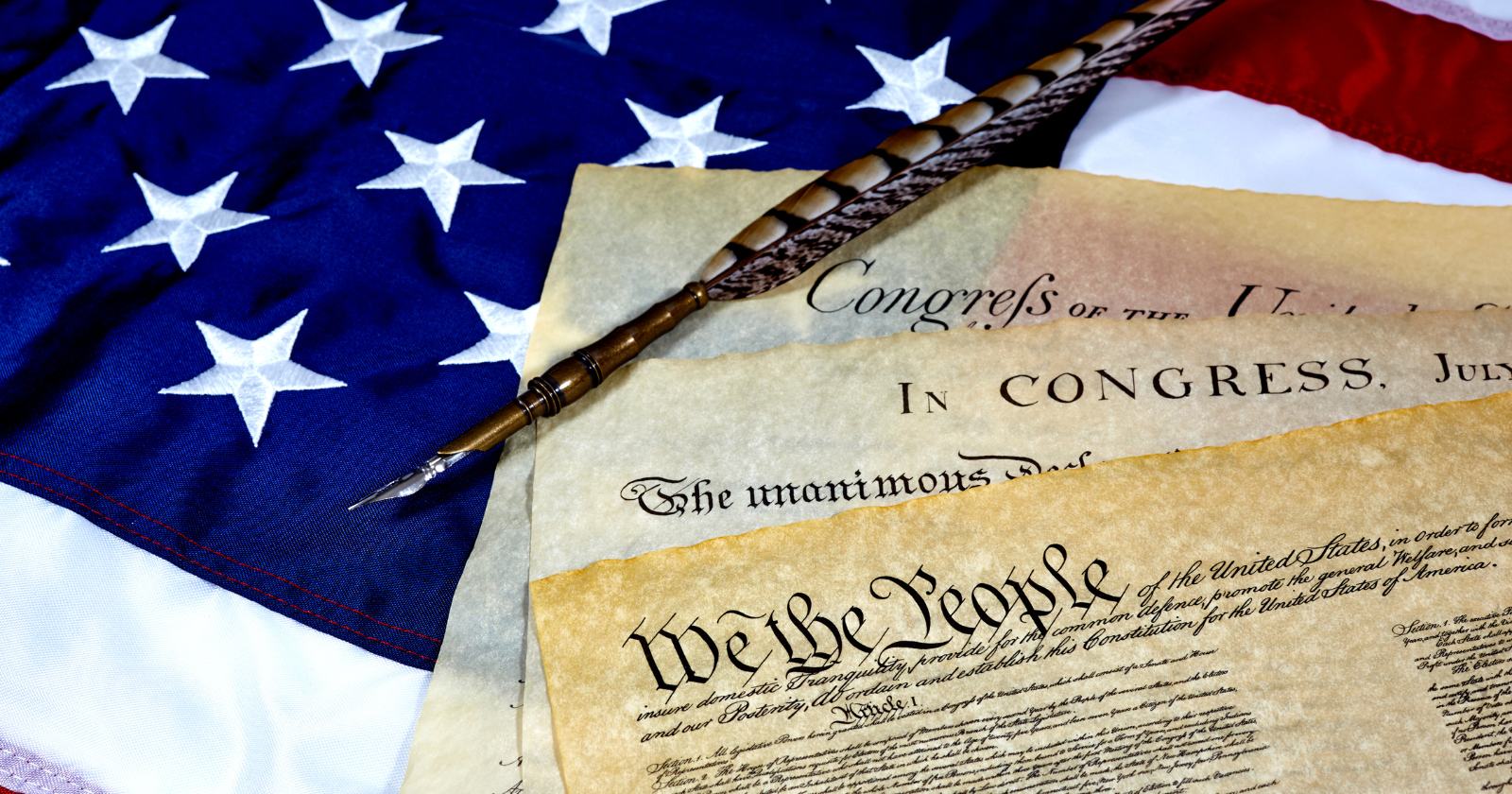“And where the Spirit of the Lord is, there is liberty.”
2 Corinthians 3:17
The U.S. Bill of Rights stands as a cornerstone of American freedom, embodying values and principles that have been debated and cherished since its inception.
It mixes Christian values with philosophical ideas to shape the country’s moral and legal foundation.
This document marks a significant point in history, showing what society valued when it was written.
In this article, we will delve into the historical context, explore the Christian values and philosophical ideas that shaped the U.S. Bill of Rights, and examine its everlasting impact on both the nation and individual lives.
Bill of Rights overview
The U.S. Bill of Rights, ratified on December 15, 1791, is the first ten amendments to the United States Constitution.
It was introduced to assure the states and the people that the Federal Government would not overstep its bounds and to protect the individual rights of American citizens.
The Bill of Rights encompasses a range of fundamental freedoms, including freedom of speech, religion, assembly, and the press, as well as protections against unreasonable searches and seizures, and guarantees fair legal procedures.
Crafted during a time of heated debate over the power of the federal government, these amendments were a compromise to safeguard personal liberties and limit governmental reach, embodying principles deeply rooted in philosophical thought and Christian values.
This pivotal document underscores the nation’s commitment to individual rights and reflects its foundational beliefs in liberty and justice.
Christian roots of the Bill of Rights
Perhaps not surprisingly, our country was formed under the Bible’s principles.
The Bill of Rights vividly reflects this foundation, showcasing how the essence of Christian values and human dignity, as depicted in Scripture, forms the bedrock of American liberty and justice.
These documents enshrine the belief that we are all created in the image of God — a conviction that has guided our nation’s development and its core principles of equality and freedom.
However, as we move through history, it’s evident that greed has, at times, eroded the moral leadership of our country.
This deviation from our foundational values reminds us of the importance of vigilance and the need to align our actions with the principles that define us continually.
But what does this mean for us today?
Reflecting on the Christian roots of the Bill of Rights and the challenges posed by greed and moral compromise reminds us of our ongoing journey towards a more perfect union.
By revisiting these foundational principles, we can inspire a renewed commitment to the virtues that should guide our nation — justice, humility, and the common good.
Which philosophers influenced the Bill of Rights?
The U.S. Bill of Rights didn’t just materialize out of thin air; it was heavily influenced by some of the most notable philosophers of the time.
These thinkers provided the intellectual scaffolding for the freedoms we hold dear today.
Let’s take a closer look:
1) John Locke
Often referred to as the “Father of Liberalism,” Locke’s ideas on natural rights, government by consent, and the right of rebellion against unjust rulers laid foundational stones for American democracy.
His belief that life, liberty, and property are inalienable rights that governments are created to protect is echoed throughout the Bill of Rights.
2) Baron de Montesquieu
Montesquieu’s advocacy for the separation of powers in government to prevent tyranny and ensure liberty influenced the structure of the U.S. government.
His ideas are most visible in the creation of the three branches of government: executive, legislative, and judicial.
3) Sir William Blackstone
Blackstone’s Commentaries on the Laws of England consolidated the common law in a way that was accessible to the American colonists, influencing their views on justice and the role of laws in protecting individual rights.
As you can see, these philosophers, among others, provided the intellectual framework that guided our Founding Fathers in drafting the Constitution and the Bill of Rights.
Their contributions remind us of the enduring power of ideas and the importance of philosophical inquiry in shaping the contours of society.
6 principles from the Bill of Rights for today’s faith
1) Freedom of religion
Today, we all know that the freedom to practice your religion and follow your conscience is foundational to living authentically as a Christian.
However, this principle, enshrined in the First Amendment, isn’t just about attending church on Sundays.
It’s about living out your faith every day, in every aspect of your life.
Let’s consider how this freedom allows us to explore and grow in our relationship with God, without fear of government interference or societal retribution.
It’s a call to engage deeply with our beliefs, to question, to seek, and ultimately, to embody Christ’s teachings more fully.
Imagine a society that fully embraces this freedom — where diverse religious expressions aren’t seen as threats but as reflections of our collective search for truth.
By championing this right, we not only ensure our ability to worship freely but also advocate for a world that respects and honors all paths to the divine.
2) Freedom of speech and expression
Now, let’s talk about the power of words.
Freedom of speech and expression is a tool of immense power, a gift that enables us to share the love and wisdom of Christ with the world.
This right, protected by the First Amendment, empowers us to speak truth to power, to uplift the downtrodden, and to spread the message of salvation. But with great power comes great responsibility.
How we use our words, in speech or writing, can build bridges or erect walls. Think about the impact of your words and the potential they hold to bring light into the darkest corners.
Maybe it’s time to ask ourselves:
Are we using this freedom to reflect God’s grace and love?
After all, as Christians, we’re called to use our voices to proclaim the Gospel and advocate for justice, peace, and love in a world that desperately needs it.
3) Cruel and unusual punishments
Reflect for a moment on the principle that safeguards us against cruel and unusual punishments, rooted in the Eighth Amendment.
This tenet calls us to remember the inherent dignity of every individual, echoing the mercy and compassion Jesus showed to all.
Consider the example of the early Christian martyrs, who faced unimaginable suffering with grace and forgiveness.
Their stories inspire us to advocate for a justice system that reflects not just the letter of the law, but its spirit of mercy and redemption.
Let’s champion reforms that honor the image of God in every person, ensuring that punishment, when necessary, is just and humane.
This commitment aligns with our call to love our neighbors, to forgive endlessly, and to seek restoration over retribution.
4) Right to privacy and security
Have you ever thought about the sanctity of your personal space and confidentiality?
Well, the Fourth Amendment enshrines our right to privacy and security, reminding us of the value God places on the innermost parts of our lives.
This protection invites us to create spaces of trust and safety, where spiritual growth and personal reflection can flourish.
Moreover, it challenges us to respect the privacy of others just as we cherish our own, fostering relationships built on mutual respect and understanding.
In a world where easy access to our personal details can lead to misuse, this right becomes even more crucial.
That’s why we should all consider how we can protect and respect the personal boundaries of those around us. That way, we can embody Christ’s teachings on love and respect in our interactions.
5) Justice and fair treatment for all
The concept of justice and fair treatment for all is deeply embedded in the ethos of the Bill of Rights.
Therefore, it ideally resonates with the biblical call to “do justice, love kindness, and walk humbly with your God” (Micah 6:8).
First of all, this principle urges us to be advocates for equity, ensuring that every individual, regardless of their background or circumstances, receives equal treatment under the law.
But also, it compels us to question disparities and work toward a society where justice prevails in every courtroom, community, and conversation.
6) Empowerment to act
Finally, the Bill of Rights doesn’t just protect freedoms — it empowers us to act within our spheres of influence.
This empowerment is a call to action, reminding us that with great freedom comes the responsibility to use our voices, talents, and resources for the common good.
How can you use your freedom to advocate for change, support those in need, and spread kindness in your community?
Think about the parable of the Good Samaritan, who didn’t just acknowledge the injured man but took decisive action to help him.
Because this story teaches us the importance of being active participants in our world, using our liberties to make a positive impact.
Final thoughts: Reclaim American liberty
In conclusion, the exploration of the U.S. Bill of Rights does not end with its history or its initial impact.
Those who delve into this pivotal document seek more than just knowledge — they seek to apply its principles to contemporary issues and personal beliefs.
With its roots in Christian values and philosophical insights, the Bill of Rights encourages us to explore freedom, responsibility, and the essence of governance.
Here’s how you can make it personal:
- Reflect on the relevance of each amendment today. How do these rights play out in your life?
- Join community groups or forums dedicated to discussing constitutional rights and civic engagement.
- Study how the Supreme Court interprets the Bill of Rights in landmark cases.
In essence, understanding the U.S. Bill of Rights goes beyond mere knowledge acquisition.
It’s about empowering yourself to protect your freedoms, stand up for justice, and actively shape a community that lives up to the ideals enshrined in this crucial document.










